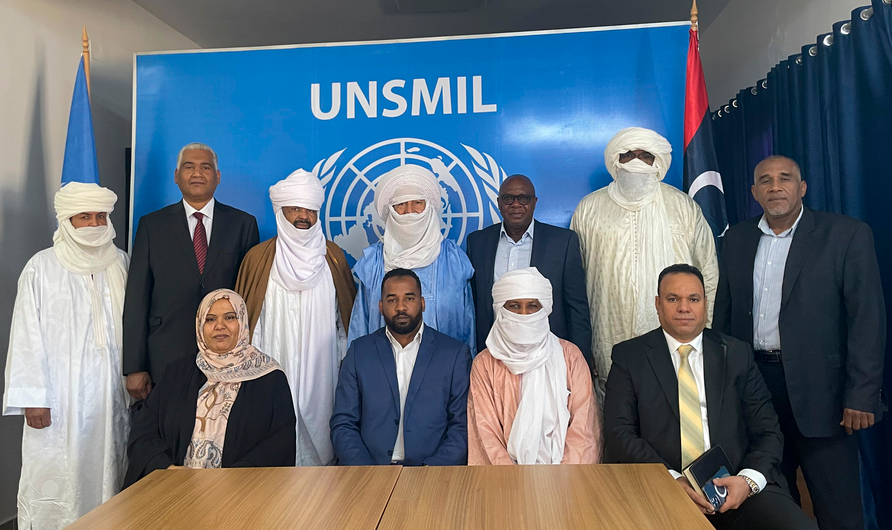
Tuareg delegation from Fezzan meeting UNSMIL representatives – 16.04.23
The geostrategic importance of Libya’s southern region makes it essential that, with the support of the UN, the country’s military and security actors quickly include it in all talks to resolve the ongoing political stalemate. This is crucial for the success of a plan to ensure that there are comprehensive elections and, in particular, the establishment of a joint military force. After the Eid al-Fitr holiday on 21-23 April the UN Special Envoy, Abdoulaye Bathily, will activate this general approach in tandem with his 18 April briefing on Libya to the UN Security Council (UNSC).
In his latest report to the UNSC, the Secretary-General, António Guterres, emphasised the ongoing political deadlock in Libya. He noted the disappointment of its people regarding their aspirations and right to elect their leaders and representatives through free, fair, transparent, and inclusive elections. Guterres also referred to the frustration felt by Libyans because of the continued political impasse and mentioned the growing doubts about reaching a consensus on a practical path for holding elections.
Libya-watchers believe that subsequent efforts to prevent the two legislative bodies — the Tobruk-based House of Representatives (House), and the Tripoli-based High Council of State (HCS) — from unilaterally deciding the country’s fate must involve: greater openness towards military leaders and armed groups; revitalising the role of civil society; and, most importantly, a focusing on the south. Although historically marginalised by the two more populous and prosperous coastal regions, Fezzan has always been the third element to a political and security solution after the effective civil war between Tripolitania and Cyrenaica when Khalifa Haftar’s eastern based Libyan Arab Armed Forces (LAAF) laid siege to the capital between April 2019 and October 2021. The south has suffered from human smuggling gangs, arms and drug trafficking, and the presence of foreign mercenaries, which has negatively impacted the north and prompted European pressure on successive governments.
Bathily therefore visited the region where he met military and security leaders from the Sebha Municipal Council. He listened to their views and emphasised the importance of properly integrating Fezzan into all ongoing efforts to resolve the country’s crisis. Bathily stressed the need for the south to ‘participate in reconstruction and for its people to enjoy the benefits of their land, empowering them economically and socially to experience equal citizenship.’
Bathily also met representatives from local social councils who expressed their frustration about the country’s endless transitional stages. They called for: an end to the marginalisation of the south; a fairer distribution of resources; and the appropriate involvement of Fezzan in various dialogue tracks to support the electoral process. In the coming days it is expected that the 5+5 Joint Military Commission (JMC) will reveal its plans for the formation of a joint force which will be deployed in strategically important areas of the south to secure the country’s borders, and securing the electoral process as the first step towards reunifying military institutions.
This excerpt is taken from our Libya Politics & Security weekly intelligence report. Click here to receive a free sample copy. Contact info@menas.co.uk for subscription details.


